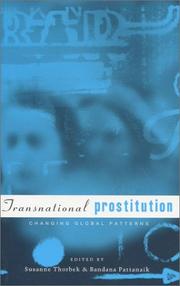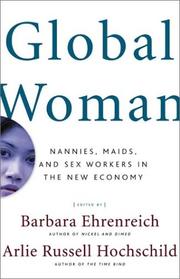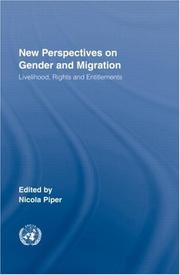| Listing 1 - 7 of 7 |
Sort by
|
Book
ISBN: 9780813386171 0813386179 Year: 1993 Publisher: Colorado: Westview press,
Abstract | Keywords | Export | Availability | Bookmark
 Loading...
Loading...Choose an application
- Reference Manager
- EndNote
- RefWorks (Direct export to RefWorks)

ISBN: 1842770314 9781842770313 Year: 2002 Publisher: London Zed Books
Abstract | Keywords | Export | Availability | Bookmark
 Loading...
Loading...Choose an application
- Reference Manager
- EndNote
- RefWorks (Direct export to RefWorks)
Prostitution. --- Women alien labor. --- Sex tourism. --- Women foreign workers. --- Law --- Sociology of work --- Demography --- Sociology of the family. Sociology of sexuality --- Denmark --- Netherlands --- Canada --- Sweden --- Germany --- Thailand --- Spain --- Australia --- Men --- Migration --- Sex work --- Attitudes --- Sex industry --- Legislation --- Book
Book
ISBN: 2747579751 233628362X 2940503907 2296390056 9782747579759 Year: 2005 Volume: 5 Publisher: Graduate Institute Publications
Abstract | Keywords | Export | Availability | Bookmark
 Loading...
Loading...Choose an application
- Reference Manager
- EndNote
- RefWorks (Direct export to RefWorks)
Le nouvel ordre économique néolibéral modifie la division internationale du travail, ce qui entraîne un accroissement des populations migrantes de travailleurs et de travailleuses. Actuellement, une personne sur dix dans les régions développées est migrante, et les femmes représentent la moitié de ce nombre. Longtemps, pourtant, la figure du migrant a été représentée comme masculine, en raison des représentations stéréotypées ou erronées du rôle et de la place des femmes et des hommes dans les sociétés, et les recherches ou programmes relatifs aux migrants ont ignoré la composante féminine des migrations. Or, les femmes migrent bien, elles aussi. Une grande partie des femmes migrantes – même qualifiées – travaillent dans le secteur des soins ou des emplois domestiques. Le transfert international des soins et de l’attention aux autres (care) – sorte de nouvelle matière première extraite des pays du Sud pour être consommée dans les pays riches – est un nouvel échange inégal. Les espaces où se réalise le travail des migrantes restent souvent invisibles, lieus de peu de droits. Si les discriminations et les abus sont à dénoncer, l’image de victime accolée aux migrantes et cependant loin de convenir. La trajectoire migratoire demande pugnacité et courage. Et nous pouvons nous demander s’il ne s’agit pas du départ des personnes les plus combatives de la société… Les identités se transforment dans l’expérience de la migration : comme le dit l’une d’elles, « je ne suis plus celle que j’ai laissée derrière moi ». Des réseaux transnationaux se construisent, accompagnés d’une circulation d’idées, de nouvelles représentations, de projets, de flux financiers. En 2002, les revenus du travail des migrants atteignaient 73 milliards de dollars, un montant plus élevé que celui de l’aide internationale au développement. Un nouvel ordre colonial s’instaure avec la nouvelle division internationale du travail. Mais les migrations des femmes et des hommes à travers les pratiques sociales…
International division of labor --- Emigration and immigration --- Women immigrants --- Division internationale du travail --- Emigration et immigration --- Immigrantes --- Women alien labor. --- International division of labor. --- Globalization --- Emigrant remittances --- Social conditions. --- Social aspects. --- Women immigrants - Social conditions. --- Globalization - Social aspects. --- Emigrant remittances - Developing countries. --- droits humains --- relations sexuelles --- féminisme --- division sexuelle du travail --- commerce international --- femmes --- développement économique --- relations hommes-femmes --- commerce équitable

ISBN: 080506995X 0805075097 9780805075090 Year: 2004 Publisher: New York (N.Y.) : Metropolitan/Owl Books,
Abstract | Keywords | Export | Availability | Bookmark
 Loading...
Loading...Choose an application
- Reference Manager
- EndNote
- RefWorks (Direct export to RefWorks)
In a remarkable pairing, two renowned social critics offer a groundbreaking anthology that examines the unexplored consequences of globalization on the lives of women worldwide. Women are moving around the globe as never before. But for every female executive racking up frequent flier miles, there are multitudes of women whose journeys go unnoticed. Each year, millions leave Mexico, Sri Lanka, the Philippines, and other third world countries to work in the homes, nurseries, and brothels of the first world. This broad-scale transfer of labor associated with women's traditional roles results in an odd displacement. In the new global calculus, the female energy that flows to wealthy countries is subtracted from poor ones, often to the detriment of the families left behind. The migrant nanny--or cleaning woman, nursing care attendant, maid--eases a "care deficit" in rich countries, while her absence creates a "care deficit" back home. Confronting a range of topics, from the fate of Vietnamese mail-order brides to the importation of Mexican nannies in Los Angeles and the selling of Thai girls to Japanese brothels, "Global woman offers an unprecedented look at a world shaped by mass migration and economic exchange on an ever-increasing scale. In fifteen vivid essays--of which only four have been previously published--by a diverse and distinguished group of writers, collected and introduced by best selling authors Barbara Ehrenreich and Arlie Russell Hochschild, this anthology reveals a new era in which the main resource extracted from the third world is no longer gold or silver, but love.
Women household employees --- Women foreign workers --- Women --- Minority women --- Nannies --- Prostitution --- Employées de maison --- Travailleuses étrangères --- Femmes --- Femmes issues des minorités --- Bonnes d'enfants --- Employment --- Travail --- Women domestics. --- Women alien labor. --- Nannies. --- Prostitution. --- Employment. --- Employées de maison --- Travailleuses étrangères --- Femmes issues des minorités --- Kvinnor på arbetsmarknaden. --- Hushållsarbete. --- Transnationalisering. --- Migration --- Women household employees. --- Women foreign workers. --- Trabalho feminino. --- Emprego. --- Mulheres (aspectos socioeconômicos). --- Globalisierung. --- Hausgehilfin. --- Frauenarbeit. --- Niedriglohn. --- Transnationalism. --- Genusaspekter. --- Women - Employment. --- Minority women - Employment.

ISBN: 0415956498 0415874491 9780415956499 9780415874496 Year: 2008 Publisher: New York Routledge
Abstract | Keywords | Export | Availability | Bookmark
 Loading...
Loading...Choose an application
- Reference Manager
- EndNote
- RefWorks (Direct export to RefWorks)
Sociology of minorities --- Sociology of the family. Sociology of sexuality --- Sociology of social welfare --- Social policy --- Demography --- Political systems --- Human rights --- Housekeeping --- Europe --- East Asia --- Southeast Asia --- South Africa --- Mexico --- United States --- Oceania with Australia --- United States of America --- Women immigrants --- Women foreign workers --- Women's rights --- Social stratification --- Social stratification. --- Women alien labor. --- Women foreign workers. --- Women immigrants. --- Women's rights. --- Gender --- Migration --- Government policy --- Political participation --- Social security --- Refugees --- Book --- Chiffres --- Service staff --- Empowerment
Book
ISBN: 9780814776001 9780814775998 0814776000 0814775993 Year: 2009 Publisher: New York, N.Y. New York University Press
Abstract | Keywords | Export | Availability | Bookmark
 Loading...
Loading...Choose an application
- Reference Manager
- EndNote
- RefWorks (Direct export to RefWorks)
Migration. Refugees --- Citizenship. --- Citizenship --- Emigration and immigration --- Aliens. --- Women alien labor. --- Women refugees. --- Citoyenneté --- Emigration et immigration --- Etrangers --- Travailleuses étrangères --- Réfugiées --- Social aspects. --- Aspect social --- Aliens --- Women foreign workers --- Women refugees --- Social aspects --- #SBIB:39A6 --- #SBIB:321H30 --- #SBIB:314H250 --- Refugee women --- Refugees --- Foreign women workers --- Women alien labor --- Migrant women labor (Foreign workers) --- Migrant women workers (Foreign workers) --- Women migrant labor (Foreign workers) --- Women migrant workers (Foreign workers) --- Foreign workers --- Women employees --- Enemy aliens --- Expatriates --- Foreign citizens (Aliens) --- Foreign population --- Foreign residents --- Foreigners --- Noncitizens --- Resident aliens --- Unnaturalized foreign residents --- Persons --- Deportees --- Exiles --- Immigrants --- Birthright citizenship --- Citizenship (International law) --- National citizenship --- Nationality (Citizenship) --- Political science --- Public law --- Allegiance --- Civics --- Domicile --- Political rights --- Etniciteit / Migratiebeleid en -problemen --- Hedendaagse politieke en sociale theorieën (vanaf de 19de eeuw): algemeen (incl. utilitarisme, burgerschap) --- Migratie: algemeen --- Legal status, laws, etc. --- Law and legislation --- Women foreign workers. --- Citoyenneté --- Travailleuses étrangères --- Réfugiées --- Noncitizens. --- Illegal aliens --- Illegal immigrants --- Non-citizens --- Unauthorized immigrants --- Undocumented aliens --- Undocumented immigrants --- Citizenship - Social aspects --- Emigration and immigration - Social aspects --- Etats-Unis --- Pays-Bas --- Iran --- Maroc --- Canada --- Australie
Book
ISSN: 18761518 ISBN: 9789004181229 9004181229 9789004193673 9004193677 9786612952210 1282952218 9781282952218 6612952210 Year: 2010 Volume: 5 Publisher: Leiden Boston Brill
Abstract | Keywords | Export | Availability | Bookmark
 Loading...
Loading...Choose an application
- Reference Manager
- EndNote
- RefWorks (Direct export to RefWorks)
Migration has long been associated with the social sciences. However, as a phenomenon that provides windows into possibly new forms of oppression and, at the same time, paths toward human liberation a systematic theological look at contemporary migration is long overdue. Building on the emerging interest on migration in theology this book presents an intercultural theology of migration drawn from the experience of Filipino women domestic workers in Hong Kong in dialogue with theological ethics and liberationist theologies. The result is a new look at the phenomenon of contemporary migration.
Women foreign workers --- Women household employees --- Foreign workers, Philippine --- Feminist theology --- Liberation theology --- Emigration and immigration --- Religious aspects --- Christianity --- -Women household employees --- -Foreign workers, Philippine --- -Feminist theology. --- Liberation theology. --- -241.1*31 --- 314.7 <5> --- 230*711 --- Immigration --- International migration --- Migration, International --- Population geography --- Assimilation (Sociology) --- Colonization --- Theology of liberation --- Theology, Doctrinal --- Kairos documents --- Philosophy of liberation --- Theology, Feminist --- Alien labor, Philippine --- Filipino foreign workers --- Philippine foreign workers --- Housemaids --- Maids, House --- Women domestics --- Women servants --- Household employees --- Foreign women workers --- Women alien labor --- Migrant women labor (Foreign workers) --- Migrant women workers (Foreign workers) --- Women migrant labor (Foreign workers) --- Women migrant workers (Foreign workers) --- Foreign workers --- Women employees --- -Christianity. --- Politieke theologie. Bevrijdingstheologie. Ethiek van de revolutie --- Migratie. Geografische mobiliteit. Verhuizingen--(demografie)--Azië --- Feministische theologie --- 230*711 Feministische theologie --- 314.7 <5> Migratie. Geografische mobiliteit. Verhuizingen--(demografie)--Azië --- 241.1*31 Politieke theologie. Bevrijdingstheologie. Ethiek van de revolutie --- Foreign workers, Filipino --- 241.1*31 --- Religious aspects&delete& --- Feminist theology. --- Christianity. --- Women foreign workers - China - Hong Kong --- Women household employees - China - Hong Kong --- Foreign workers, Philippine - China - Hong Kong --- Emigration and immigration - Religious aspects - Christianity
| Listing 1 - 7 of 7 |
Sort by
|

 Search
Search Feedback
Feedback About UniCat
About UniCat  Help
Help News
News